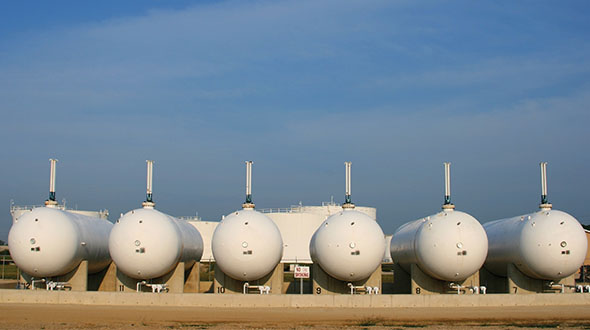Industry experts weigh in on approaches to the COVID-19 pandemic
As 2021 approaches, the novel coronavirus pandemic continues to put pressure on the ways we are accustomed to doing business. However, the essential nature of propane delivery and heightened use of the fuel in residences have shielded the industry from the pandemic’s worst economic effects.

The essential nature of the industry has kept gallons flowing, but navigating a pandemic requires business acumen. Photo: JennaWagner/iStock / Getty Images Plus/Getty Images
“Most propane retailers have done very well in the pandemic, particularly if they have barbecue tank exchange cylinders – the business is just through the roof,” says Steve Abbate, managing director of Cetane Associates, a mergers and acquisitions advisory firm.
“From speaking with our clients, we don’t see a real slowdown due to the pandemic in most areas,” he adds.
Financial and operational challenges remain nonetheless.
Propane retailers whose gallon sales rely on restaurants or tourism have faced some financial stress, says Abbate.
And all companies have had to come to terms with sanitation and social distancing procedures, remote work and new ways of interacting with customers.
The onset of the pandemic in March, at the tail end of the 2019-20 winter, has allowed the industry crucial time to adjust before the 2020-21 winter arrives.
We asked six propane industry experts to share what they’ve learned so far about navigating the pandemic and offer suggestions about managing these unprecedented times financially.
Their areas of expertise range widely – from acquisitions advisory and supply management to accounting, marketing and safety.
Common threads among this diverse group’s advice include heightening use of technology and improving methods of communication with customers to keep them apprised of changes and to meet differing needs. The panelists also provide a variety of suggestions for proactively managing cost and boosting the bottom line.
This guidance aims to help marketers keep employees safe, retain and expand customer bases, streamline operations and ultimately protect the financial health of the propane industry for continued success in the new year.
What best practices should retailers implement to navigate the pandemic in 2021?
In what ways can retailers boost the bottom line and manage unprecedented times financially?
PROTECT EMPLOYEES, PROTECT YOUR BUSINESS
Steve Abbate
Managing director, principal, Cetane Associates
Mergers and acquisitions advisory, valuation services

Abbate
It’s really important to follow safety protocols during the pandemic. The fear is that one of your drivers or service technicians gets sick with COVID and they had close contact with other employees. If it sweeps through an office, it could have devastating effects.
It’s tough enough that there’s a driver shortage. We’ve been trying to do things in Congress at Propane Days the last couple of years to alleviate this shortage of CDL licensed drivers. Now, if you get a whole driver pool sitting around a table routing their tickets together without masks on or without sanitary precautions – if you get a couple drivers down, your customers are going to leave you if they can’t get fuel. So it’s really important.
We’ve heard from people they’re having more employees work from home and they’re finding it very productive, and employees enjoy it because they don’t have the long commutes. Businesses are finding they need fewer offices, and they’re finding operational savings in working remotely. Evaluate operating expense in running a remote office to see if it’s a possibility for long-term reduction in expenses and/or increased customer satisfaction.
Increase your focus on the sale of propane appliances such as pool heaters, patio heaters and generators because that will have long-term effects on continued gallon usage into the future. People are investing into the home rather than taking that European vacation. The more we build our network of propane appliances, the more essential we are as an industry, and that helps protect us as an industry.
Review your debt structure to see if there’s an ability to refinance and save on interest expense. Interest rates have gotten lower because the economy has been negatively affected as a whole, and the Federal Reserve has lowered interest rates and says it’s going to keep them low. When interest payments go down, and cash flow goes up, and you’re in a better cash position, it makes for a healthier business. The loosening up of capital markets particularly through the low interest rates has been a positive for propane marketers.
FOCUS ON CUSTOMER RELATIONS
JD Buss
Trading manager, Twin Feathers
Supply and risk management strategies

Buss
Efficiency and communication should be key elements of navigating an extension of the pandemic into 2021. With customers spending more time at home, usage statistics will change. Higher usage could mean more frequent run-outs, changing company distribution routes and potentially more contentious calls with customers. By monitoring tank levels, the retailer can respond efficiently while also providing an opportunity for the retailer to maximize the assets they control in their supply chain. Proactive communication to the retailer’s client about efforts to monitor and enhance the efficiency of deliveries will both help retain customers and provide future referrals.
Get back to basics – focus on your greatest value and greatest asset. Retail propane distributors traditionally have larger gross margins than other fuel distributors, which is an excellent aspect of this business sector. Maintaining strong customer relationships and growing your customer base can often provide larger returns than micromanaging some costs within your supply chain.
Supply chain costs are not inconsequential by any means but should be kept in perspective. A reduction in your supply chain of 2 cents per gallon could generate a 1 to 2 percent cost savings for that month or year.
However, adding 2 percent more retail volume sales will provide higher gross margins both for this year and help create a potential future annuity.
Both perspectives are necessary for a business, but in these unprecedented financial times, we recommend partnering with an adviser or supplier that can help manage your costs, which then allows you to focus on your greatest asset – your customer base, which ultimately generates your greatest value for the future.
SHIFT TO DIGITAL OPERATIONS
Rich Goldberg
President, Warm Thoughts Communications
Marketing and sales strategy, website design, search engine optimization, reputation management, social media, digital advertising, broadcast advertising, brand development and customer communications, sales and customer service training

Goldberg
With respect to customer communication and marketing, we’ve seen a significant consumer shift to online and social engagement. We’ve also seen a surge in property transfers and in customers willing to invest in their home comfort. Targeting property transfers and securing your own move-ins, checking your website performance metrics to make sure you are showing up when customers search in all the towns you serve and for all the products you sell, and generating more and better reviews so you are over 4.2 stars on Google are big priorities now.
It is critical that marketers get email addresses and cellphone information in case they need to alert large groups of customers of shifts like offices temporarily shutting down, delays in deliveries due to driver sickness, promote credit card or electronic funds transfer (EFT) payment, or new protocols for service in homes. In times of crisis, customers want more reassurance and contact with their essential providers. Marketers need to win the safety optics test. In ads, posts online and newsletters, look like you are taking all possible precautions to protect customers and employees.
Cash flow could potentially be an issue in many areas when the full force of the recession manifests. Marketers should focus on shifting more customers from traditional billing to credit card or EFT payment. Rather than offer an ongoing discount, a simple $20 incentive works wonders if presented correctly. Customers are used to doing this now with Amazon and Walmart online.
I would also look carefully at adding a delivery fee charge this year. Hundreds of propane companies do this with marginal consumer pushback. Your bottom line could benefit greatly from $6 or $8 per delivery.
KEEP A STRONG BALANCE SHEET
Marty Kirshner
Director, chair of the Energy Practice Group, Gray, Gray & Gray
Financial consulting, accounting and tax services

Kirshner
Keep your balance sheet strong and maintain the mantra that cash is king. Be as aggressive as possible on cash collections, and negotiate terms with slow-paying customers, understanding that many are affected by the pandemic. Offer one-time discounts to get old receivables in the door. Manage your parts inventory, and keep the number as low as possible. The higher the number, the more capital is tied up. You do not want to be bank reliant. Banks are, by no choice of their own, going to be under heavy regulations and restrictions and won’t be as lenient as in the past with lending and covenants.
Understand your break-even gallons and margin. Now add in the additional costs you will incur as a result of COVID-19. Make sure your selling price allows you to recover those costs, or add a delivery fee, if legal in your state, to ensure you can recover these costs.
Cut down on unnecessary overhead. If you have too much space that’s being unused, look to sublease or find new space.
Do a market study of your customers. Find out what other services they would be willing to take from you. You’re one of the few people allowed at their homes right now, so take advantage of that trust and see what other services you can do to generate additional profits – it’s intentional diversification.
Retailers need to invest in technology and leverage their current technology to be as nimble as possible in these times. Outside of deliveries and service calls, every other function of the company needs to have the capability to be done remotely – little things like making sure your fuel management software syncs up automatically to your financial reporting and having a platform that you can access from anywhere.
Understand that in this environment information is passing through technology and not paper. More customers will be paying with credit card, transacting via website and communicating via social media or other avenues.
ESTABLISH SAFETY PROCEDURES
Eric H. Leskinen
Executive vice president, P3 Propane Safety
P3 mobile app and mobile safety inspections, P3 Compliance System safety documentation, safety training and consulting services, policies and procedures manuals

Leskinen
Use mobile technology to minimize customer and employee contact. Using an electronic safety documentation system with mobile features can help maintain social distancing and minimize contact. Technicians in the field can complete inspection forms electronically, which are automatically sent to the customer and the office instead of passing forms back and forth in person. Office staff and management teams have direct access to all of your safety documentation data, whether they are in the office or working from home.
Establish pandemic-specific policies and procedures. It is critical to develop and implement company-specific policies and procedures in response to the circumstances of COVID-19. They will outline how your company will operate during the pandemic to mitigate risk while continuing operations as safely and efficiently as possible.
As it gets colder and companies get busier, these policies and procedures will identify how employees will perform tasks during a pandemic and how employees will communicate these adjusted services and protocols to customers.
Take a step back and look at your safety documentation. The average industry error rate is 30 percent. This means 30 percent of your safety documentation could be putting you at risk for expensive scenarios – a major threat to financial well-being during uncertain times. Having a process in place to achieve accurate safety documentation is essential to reducing callbacks and will save billable hours fixing incorrect paperwork.
COMMUNICATE AND EDUCATE
Cooper Wilburn
Financial analyst, Propane Resources
Valuations for estate planning, third party sale, buy and sell side advisory, supply and risk management, marketing

Wilburn
Openly communicate with staff and customers. This includes not only listening to your customers but informing them about various programs that can help them through tough times. Ensure that your customers know about the Low Income Home Energy Assistance Program (LIHEAP) and other financial/energy assistance programs that are available in your area.
Also, programs such as budget billing may be helpful in times when money is tight. Do keep-full customers get the best pricing for your customer base? Make sure that your customers know this. Letting customers know that there is a cost benefit when becoming a keep-full customer is a good way to increase your keep-full customer base. If you want to increase your company-owned tank percentage, it’s a good year to offer a buy-back program to customers who own their propane tanks.
Fortunately for retailers, wholesale supply for propane has stayed steady. Make sure to have a supply plan in place so that there are no surprises in the middle of winter, which could suppress margins; it may be tough to push higher prices onto customers that are already struggling. Further, look at your assets, specifically consumer tanks; if there are tanks out in the field that are not being utilized, pick them up versus buying new ones. This can help save some precious cash that can be used in other areas.
















